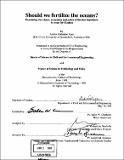Should we fertilize the oceans? : examining the science, economics and policy of the iron hypothesis & ocean fertilization
Author(s)
Ryan, Andrea Catherine, 1968-
DownloadFull printable version (18.39Mb)
Advisor
Pr. Sallie W. Chisholm.
Terms of use
Metadata
Show full item recordAbstract
John Martin's 'iron hypothesis' (Martin, 1990), and the subsequent ground-breaking IRONEX experiments (Martin 1994, Coale 1996) have stimulated wide spread speculation about the concept of fertilizing the oceans. It has been suggested that adding nutrients to the open oceans will stimulate primary production, increasing the sequestration of carbon dioxide and enhancing potential fish harvest. Ocean fertilization has thus been heralded as a possible cure for global climate change and world food shortages. Despite considerable scientific effort, private investment, and public interest in this field there has been limited evaluation of the feasibility of ocean fertilization. This thesis attempts to fill this void by addressing not only the scientific, but also the economic and policy dimensions of ocean fertilization. It starts by reviewing current research proposals and implementation activities in the field of ocean fertilization. It identifies potential environmental impacts and biogeochemical consequences of ocean fertilization, highlighting the outstanding scientific unknowns associated with this field. The study reviews cost estimates compiled by the private sector, and examines likely practical obstacles to implementation. Legal, political and public response to fertilization proposals is also explored. Finally, some of the ethical concerns relating to fertilizing the oceans are discussed, and recommendations on future research directions and initiatives to manage this rapidly growing field are provided.
Description
Thesis (S.M.)--Massachusetts Institute of Technology, Dept. of Civil and Environmental Engineering; and, (S.M.)--Massachusetts Institute of Technology, Technology and Policy Program, 1998. Includes bibliographical references.
Date issued
1998Department
Massachusetts Institute of Technology. Department of Civil and Environmental Engineering; Technology and Policy ProgramPublisher
Massachusetts Institute of Technology
Keywords
Civil and Environmental Engineering, Technology and Policy Program